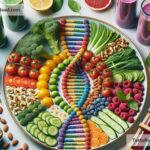Exploring the Role of Personalized Nutrition in Health
In recent years, people have become more aware of how their food choices affect their health and well-being. While general nutrition advice—such as eating more fruits and vegetables or cutting down on sugary snacks—works for most people, there is growing interest in a more tailored approach known as personalized nutrition. This way of eating considers a person’s unique needs, preferences, and biology to create a diet that supports their individual health goals. Let’s dive into what personalized nutrition is, why it’s important, and how it might transform the way we think about food and health.
What Is Personalized Nutrition?
Personalized nutrition is a newer idea in the field of health and wellness. It’s all about designing a diet based on the specifics of a person’s body, lifestyle, and even genetics. Instead of offering one-size-fits-all guidelines, this approach looks at factors like:
- Age: Nutritional needs change as you grow older.
- Gender: Men and women often have different dietary requirements.
- Activity Level: Athletes need more calories and nutrients compared to people with sedentary lifestyles.
- Genetics: Some people process certain foods differently because of their DNA.
- Health Conditions: Conditions like diabetes, high blood pressure, or food allergies can influence what foods are best for you.
By understanding these factors, personalized nutrition can help people eat in a way that fits their unique needs. It’s like having a roadmap for your health, guided by what works best for you rather than following general dietary rules.
Why Is Personalized Nutrition Important?
Traditional nutrition advice is helpful, but it doesn’t always take into account how different we are. For example, some people feel great when they eat a high-carb diet, while others feel sluggish and perform better with more protein. Some people may be able to digest dairy without any problems, while others experience bloating or discomfort. These differences show that general advice isn’t always enough.
Personalized nutrition can address these challenges and make eating feel more purposeful. Some benefits include:
- Improved Health Outcomes: A diet designed for your unique needs can help prevent chronic diseases, manage existing conditions, and improve energy levels.
- Better Weight Management: If weight loss or maintenance is a goal, eating according to your body’s specific needs can make the process more effective and sustainable.
- Enhanced Nutrient Absorption: Eating the right foods for your body ensures that you’re getting the vitamins and minerals you need, and in the amounts that are right for you.
- Greater Satisfaction: When your diet aligns with your preferences and lifestyle, you’re more likely to enjoy your meals and stick to healthier choices.
How Is Personalized Nutrition Developed?
Personalized nutrition starts by gathering information about a person’s health and lifestyle. This information can come from:
- Medical History: Doctors might look at past health records to understand a person’s current condition.
- Genetic Testing: Some services offer DNA tests that reveal how your genes might affect your diet. For example, certain gene variations might make you more sensitive to caffeine or lactose.
- Lifestyle Assessment: This includes factors like your daily routine, sleep habits, stress levels, exercise, and food preferences.
- Blood Tests and Biomarkers: Some professionals check blood sugar levels, cholesterol, and other markers to get a better picture of internal health.
With this information, a nutrition plan can be created. This plan is often flexible, allowing adjustments based on how the person feels or changes in their lifestyle.
Technology’s Role in Personalized Nutrition
Modern technology is making personalized nutrition more accessible. Apps and wearable devices can track what you eat, monitor your activity, and measure health metrics such as heart rate or sleep quality. Artificial intelligence (AI) can then analyze this data and give recommendations, such as suggesting specific meals or reminding you to drink more water. These tools make it easier to follow a tailored eating plan and stay on top of health goals.
Another exciting development is the use of microbiome analysis in personalized nutrition. Your gut is home to trillions of bacteria, which play a huge role in digestion and overall health. By testing a person’s gut microbiome, experts can create diets that support a healthier balance of these bacteria.
Challenges in Personalized Nutrition
While personalized nutrition sounds amazing, it’s not without its challenges. For starters, it can be costly to undergo genetic testing or work with professionals to develop a personalized plan. Additionally, there is still much to learn about how factors like genetics or gut health influence what we should eat. Technology and research are advancing quickly, but they’re not yet perfect.
Another important challenge is accessibility. Not everyone has access to these advanced tools or personalized guidance. There is also a risk of misinformation, especially when companies or services exaggerate their claims.
Conclusion
Personalized nutrition is changing the way people think about food and health. Instead of following general rules, this approach looks at what works best for each individual. With advances in science and technology, we’re now able to create diets that not only enhance health but also improve the quality of life. While there are still challenges, the future of personalized nutrition is full of possibilities.
If you’re curious about personalized nutrition, start by paying attention to how certain foods make you feel and consulting a healthcare or nutrition professional for personalized advice. Remember, the best diet is not just about physical health—it’s also one that makes you feel good, inside and out!


